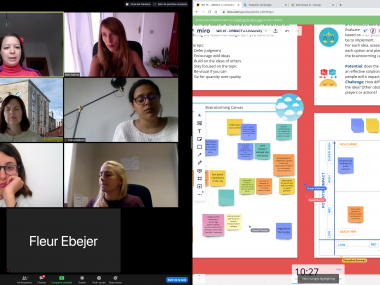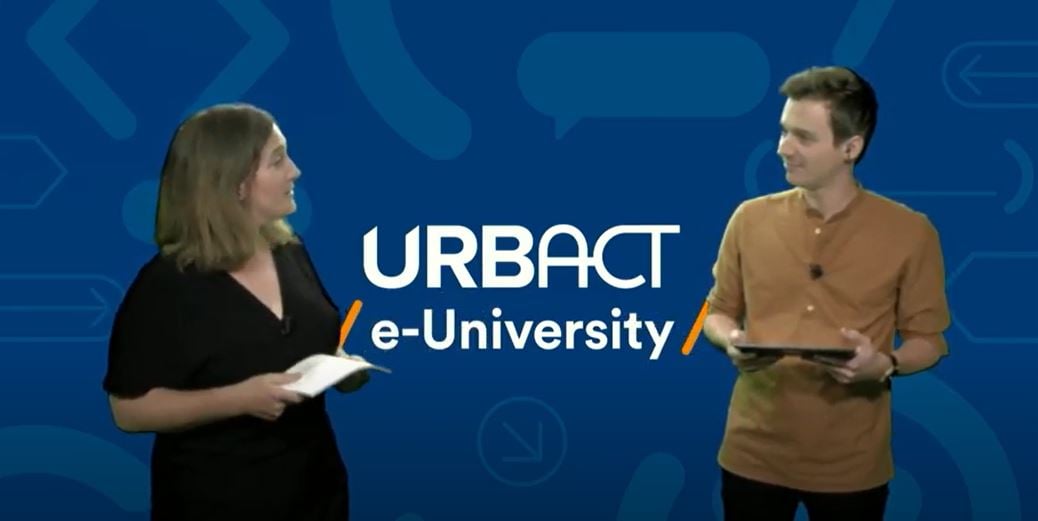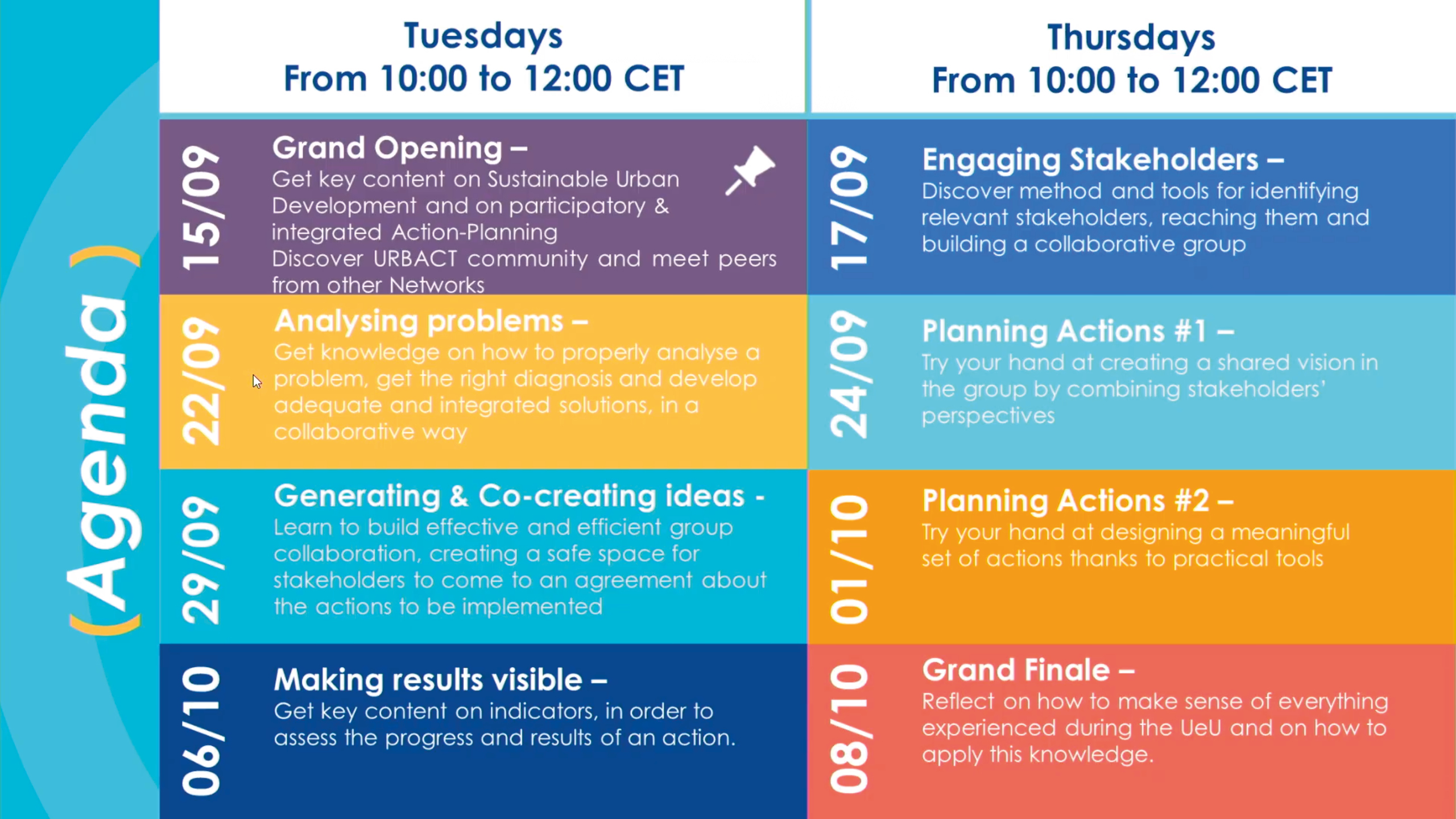URBACT e-University: knowledge exchange, digital yet entertaining
Edited on
02 March 2021The annual URBACT Summer University, an eight-day dynamic event, was carried out online in 2020. Despite the new setting and fast adaptation, the meeting proved successful with over 300 participants. It was a bold exchange of ideas and key takeaways for RiConnect.

How can we build synergies and share knowledge from home? The 2020 URBACT e-University, held September 15-October 8, 2020, faced a big challenge in adapting the Summer University from an in-person meeting in Croatia to an online meeting. Nonetheless, they managed to create an event that was entertaining and inspiring. It went further than just a series of digital presentations and it was made to be interactive and appealing. We also had the chance to help manage the event ourselves, with two of our members acting as e-facilitators.
A successful adaptation to demanding times
The URBACT e-University is aimed at gathering members from all URBACT planning networks in order to offer support and training on how to handle their action plans. In doing so, the goal is to find solutions to specific urban challenges in a comprehensive, sustainable and participatory manner. Held yearly as an in-person meeting, the 2020 edition needed to be held online due to the pandemic. It was still an enriching event for RiConnect and all involved networks since it gave us tools to develop the upcoming project phases.
There were various relevant takeaways for our network, both as a whole and at the local level: new ways to engage with our local groups, tools to make meetings more dynamic, strategies for taking action. Therefore, showing a great spirit, it resulted in a more diverse and environmentally friendly event, with more than 300 participants from 200 cities throughout Europe, and with relevant contents that helped us improve our work.

A new setup, with brief sessions along four weeks
The talks were held on eight different days over the course of four weeks in order to keep the meeting light and on point, with a two-hour session on Tuesdays and Thursdays. Participants followed the usual planning process in this session series: detection of parties involved, problem analysis, planning actions, possible ideas and potential outcomes. Inputs were thereby showed to all participants during each session and discussions were held in smaller group workshops.
A wide range of themes was worked on. These ranged from regional planning to urban participation and hosted a varied pool of speakers. Some speakers were from partner networks such as Béla Kézy from Thriving Streets APN and Mary Dellenbaugh-Losse from GenderedLandscape.
While demanding, the new e-University scheme was extremely interesting. In the days between sessions, partners were given time to comprehend the concepts and attend with renewed interest and even apply some of the tools in their networks in the meantime.
Enriching talks covering the entire planning process
The series of events started with the grand opening headed up by URBACT secretariat members Clémentine Gravier and Julien Lambert. It was an interactive session aimed to know the participants and hold an overview of the URBACT principles. This was followed two days later by an explanation on how to set up a participation group. Mary Dellenbaugh-Losse introduced us to techniques to engage with the right stakeholders for each project. This was an invaluable meeting for evaluating the steps we had taken in our Roadmaps and help us review and improve upon our local groups.
Christophe Gouache led a session the second week, guiding us through the process of problem analysis. The presentation helped us specify the definition of problems in our Action Plans and maintain a realistic scope, which is a vital step for successful urban planning action. In the week’s second session, Liat Rogel showed us how to build a shared vision for a project jointly with all stakeholders. Building a shared vision is usually a critical step in all projects, where different interests collide, and all actors need to agree on a comprehensive solution. We therefore had the chance to learn about a variety of tools that will be very helpful to our Local Groups.
The third week took us deeper into the co-creation process. Once the shared vision is set, it is time to generate specific ideas. Eileen Crowley guided us through the challenges of this stage. This was a very helpful talk on how to collaborate, especially in pandemic times, where faliltation is key for an enriching participation. These ideas should lead to specific planning actions, and Ian Graham introduced us to best ways to address the design of actions.
Finally, week four served as a wrap-up of the e-University. Béla Kézy presented on an essential topic: how to make results visible. The presentation led us through how indicators of success are defined, in order to better communicate the achievements and have a greater impact on public policy. The four-week synthesis culminated in the Grand Finale. Under Anamaria Vrabie’s guidance, all participants reflected on how our Integrated Action Plan wrapups will take place, imagining worst-case scenarios so that we can anticipate flaws before we get into trouble. The e-University concluded with these valuable contents, which helped us improve as a network.
A great result, making it possible to advance in our IAPs
The e-University was a successful and compelling event: despite the difficulties, it was dynamic and easy to follow. It gave the networks plenty of new resources and abilities to develop their integrated action plans and better address local groups. The e-University was inspiring not only for its content, but for the meeting setup as well, with solutions that can be applied to our Transnational Meetings.
Since then, we at RiConnect have made great use of the tools that were described at the e-University, both at a local and network level. This has led to better coordination with our local stakeholders, and a more dynamic and fluid exchange of ideas between all partners.
The e-University was a complete success for us. In addition, although networking was not as easy as in-person, we still had the chance to share new and bold ideas with other networks and stakeholders. We are thrilled to meet with all participants again, hopefully in person soon, and keep developing our exchange of knowledge!
All contents from the URBACT 2020 e-University are available here
 Submitted by Stela Salinas on
Submitted by Stela Salinas on

